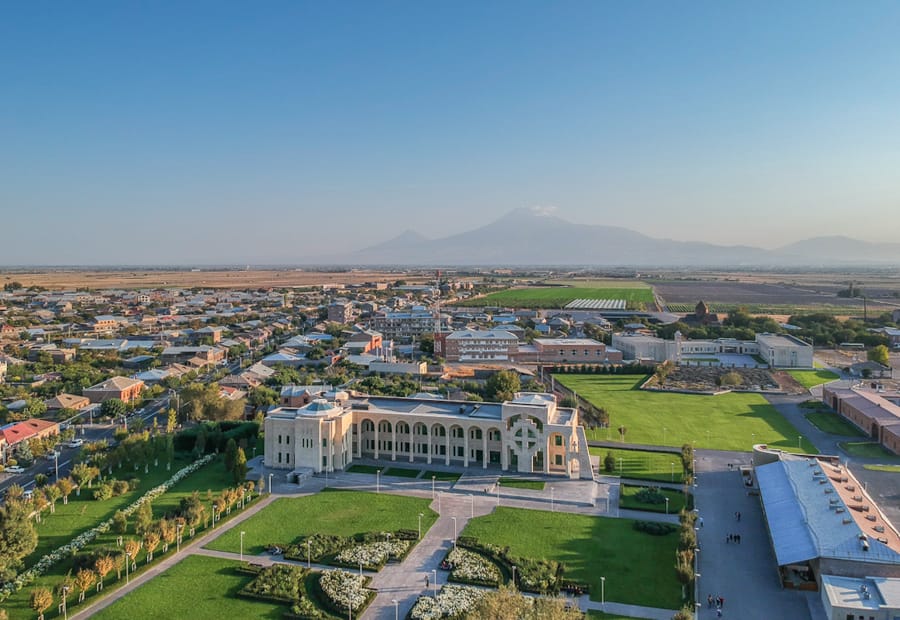The ruling Civil Contract Party has won the Vagharshapat (Etchmiadzin) City Council elections, according to preliminary results from the Central Electoral Commission. Prime Minister Nikol Pashinyan described the outcome as a signal ahead of Armenia’s 2026 parliamentary elections.
Residents of Vagharshapat voted on November 16 to elect a new city council, which will subsequently choose the city’s next mayor. Out of 69,924 eligible voters, 31,535 cast ballots. With all 47 polling stations counted, the results were as follows:
- Civil Contract Party – 15,298 votes (48.5%)
- Victory bloc – 10,051 votes (31.9%)
- Mother Armenia National-Democratic Party – 1,692 votes (5.4%)
- Republic (Hanrapetutyun) Party – 1,241 votes (3.9%)
- Fatherland (Homeland) Party – 1,193 votes (3.8%)
- Free Democrats – 1,177 votes (3.7%)
- Heritage Party – 440 votes (1.4%)
- Pan-Armenian Front Party – 295 votes (1%)
A total of 132 ballots were declared invalid.
According to the Central Electoral Commission, three political forces will hold seats in the new 33-member Vagharshapat municipal council. The seat distribution is:
- Civil Contract Party – 19 seats
- Victory bloc – 12 seats
- Mother Armenia Party – 2 seats
This configuration gives the ruling Civil Contract Party enough seats to independently appoint Vagharshapat’s next mayor without forming a coalition.
Prime Minister Pashinyan, who also chairs the Civil Contract Party board, welcomed the results in a statement posted on Facebook, calling the election a “democratic victory” for the community.
“Dear voters of Vagharshapat, I bow to all of you and congratulate you on the occasion of democratic elections,” Pashinyan said.
He stated that voters had reaffirmed their confidence by electing Argishti Mekhakyan, Civil Contract’s candidate for mayor, and by supporting the party’s broader agenda. Mekhakyan served as the governor (marzpet) of Armavir Province from December 2024 until July 2025, when he was appointed by the Prime Minister as the acting head of the Vagharshapat community following Diana Gasparyan’s resignation.
“You reaffirmed that a peaceful, prosperous, and democratic Republic of Armenia is the best way to honor the memory of our martyrs,” Pashinyan said in his statement. “You expressed unequivocal support for Civil Contract’s strategy to strengthen our statehood, independence, sovereignty, and freedom.”
Pashinyan also reiterated his ongoing criticism of Catholicos Karekin II, referring to him by his secular name, Ktrich Nersisyan, and argued that the vote gives momentum to what he described as the process of “liberating” the Mother See of Holy Etchmiadzin from illegitimate leadership.
“With your vote, you gave important momentum to the process of liberating our sanctum, the Mother See of Holy Etchmiadzin, from Ktrich Nersisyan,” the prime minister said.
He additionally acknowledged past shortcomings by Civil Contract officials in the community. “I want to ask forgiveness from all of you for those mistakes,” he said.
Pashinyan’s remark was widely interpreted as a reference to former Vagharshapat mayor Diana Gasparyan, who was backed by Civil Contract during her tenure and was formally charged by the Anti-Corruption Committee in July, shortly after stepping down in May citing “personal reasons.” Gasparyan has been linked to several corruption-related controversies, including a conflict-of-interest case involving a multimillion-dram contract she signed with her father-in-law’s company, discrepancies in her husband’s asset declarations, and a separate criminal investigation involving her in-laws over illegal construction.
Pashinyan congratulated Argishti Mekhakyan and the residents of Vagharshapat, describing the incoming mayor as modest yet effective. He also presented the municipal victory as evidence of broader nationwide support ahead of the 2026 general elections.
“I congratulate all citizens of the Republic of Armenia on this resounding prelude to the 2026 parliamentary elections. The people of the Republic of Armenia will win the 2026 parliamentary elections,” he stated.
However, former State Revenue Committee head and Wings of Unity member David Ananyan offered a different interpretation of the results, arguing that the ruling party’s victory stemmed from systemic flaws in the electoral architecture rather than broad public support. In a detailed analysis posted on Facebook, Ananyan pointed to what he called “deep structural contradictions in the local governance system.”
He noted that Civil Contract received 21.8 percent of all registered voters’ support, 15,298 out of 69,924 registered voters, yet secured a dominant share of the council seats through the proportional electoral system, the D’Hondt method of seat distribution, and existing vote thresholds.
“This outcome replaces real representation with artificial majorities,” Ananyan argued, adding that opposition forces collectively received more votes but ended up with fewer seats. “This is not a precedent. It’s a warning,” he said.
Ananyan cautioned that if the opposition remains fragmented, uncoordinated, and focused on symbolic participation rather than strategy, the same model could be replicated in the 2026 national elections, allowing the ruling party to retain power without majority public support. “There’s a dual risk. Thousands of votes for smaller parties may be ‘burned’ for failing to pass the threshold. The electoral resource will be wasted, and the ruling party will retain power through the fragmentation of its opponents,” he warned.
Politically, he said, this dynamic shifts the country from pluralism toward institutionalized one-party dominance. “This is where the most dangerous consequence emerges: the separation of legality from legitimacy. The law functions, but no longer reflects the full public will.”
Ananyan concluded that the Vagharshapat outcome should be seen as a signal ahead of 2026. “If broad alliances, real political coalitions, and a unified strategy are not formed, even a majority of votes may translate into minority representation, and public expectations may again hit a dead end,” he said.


